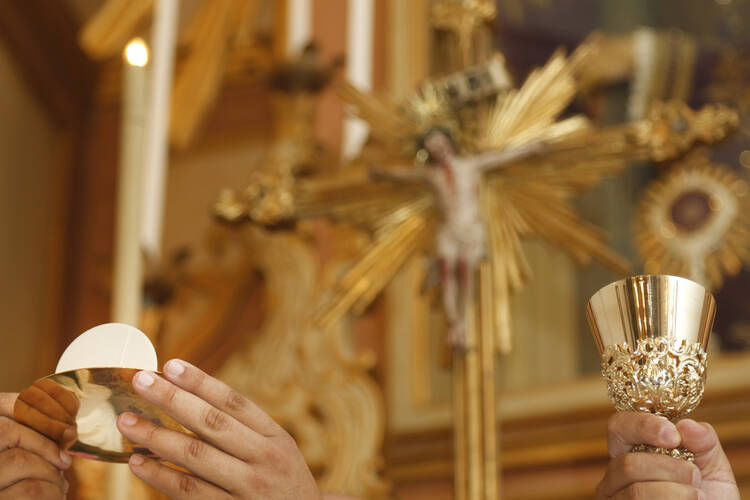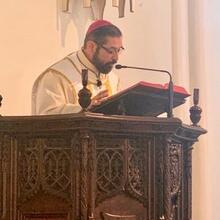We tend to think that Jesus’ words transmitted to us in the New Testament convey to us his Gospel. They do, of course, but not exhaustively. For no multiplicity of particular words can say all that is in the one Word of the Father. John’s Gospel, at the very end, says as much: “There are also many other things that Jesus did, but if these were to be described individually, I do not think the whole world would contain the books that would be written.”
Jesus not only said things; he did things as well. In fact, it is in reference to the actions of Jesus that John’s Gospel suggests a kind of inexhaustible content. The Lord Jesus never performed a sign without saying something about it; conversely, his spoken teaching was announced within the context of his actions among the people.
In this sense his presence among us was literally sacramental, for he deliberately led us by the hand to understand his actions in terms of the words he spoke. Think of the healings that Jesus performed specifically to indicate he had authority to forgive sins.
At the same time, his teaching and discourses to the crowds and disciples were spoken within the immediate world of his actions among the people. In this way he made visible to us the sense of what he was saying. Thus, Jesus taught about the fulfillment of the law in the love of God and love of neighbor. His attention to lepers and blind beggars shows us what he means by the word neighbor. So also does the parable of the good Samaritan.
The parables, in fact, have a special place in the Lord’s pedagogy of grace because they are words that evoke the visible movements of the kingdom of God. Think, then, of the great parable of judgment: “When did we see you hungry, or thirsty, or naked?” (Mt 25: 37-38).
In Christ the teaching is made visible in the flesh and blood of this world, and the flesh and blood of this world receives a word that directs its sense to God and the ways of the kingdom.
The Eucharist is the final word and action of Jesus before he enters into his Passion. This set of just a few words and visible actions frames the meaning and intent of the great sign that is his whole life, culminating in his dying and rising. It is more than this, though. It is the way he designates in advance how, after the resurrection, we are to actively participate in the meaning and intent of the Passion, in the love it signifies.
The Word speaks and makes himself present in the act of handing himself over. The narrative Jesus spoke and that we hear at every Mass is in the present tense. The present moment of Christ’s gift is the perpetual present moment of the church. The words and gestures of the priest, united to the community around the altar, make Christ’s present present to us.
The final word is the gift of himself. This gift is the content of his love, the content of the Gospel itself. The speaking accompanies the action of giving himself over. It must be spoken in advance because death is a wordless moment. By the Eucharistic action and word, his death and his rising are spoken within our hearing and thus made accessible to our entry into the gift. (“No one takes my life from me, I give it freely.” Tomorrow they will come for me, but they cannot take from me what I have already given to you.)
He said the blessing—that is, he directed what he was about to say and do to the Father. This is the single-heartedness of the Son in this gift of himself to the Father. But this gift is given for you. In this act is made present his enacting of the New Law: “You shall love the Lord your God with your whole heart, mind and soul…and your neighbor as yourself.” God made himself neighbor to us. And in that state he sought nothing more than to pour himself out to the Father, for us.
“Take this, all of you....” This that I give you is me, my life, the all that is in me. “Eat it…drink from it....” My flesh and blood given over for you, must be in you, so that as I love the Father so you can love the Father, and so you can love that other one who vexes you, frightens you, tires you, asks from you. That one was hungry. Do you see? (Do I see that other one? Who is that? That is me, he says. It is also us.)
“I do not think the whole world would contain the books that would be written.” Yet, it is summed up, here, in this place, in the Eucharistic mystery, so beyond us yet so near to us: a few words, simple actions. He unveils all that went before, and opens us to what will be. By the Spirit this is known, received, treasured and adored.
“Take this all of you.” Lord, I want to see.








